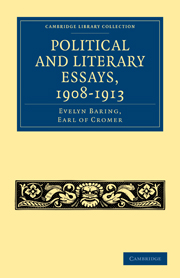Book contents
- Frontmatter
- PREFACE
- Contents
- “THE EDINBURGH REVIEW”
- “THE QUARTERLY REVIEW”
- “THE NINETEENTH CENTURY AND AFTER”
- “THE SPECTATOR”
- VIII DISRAELI
- IX RUSSIAN ROMANCE
- X THE WRITING OF HISTORY
- XI THE GREEK ANTHOLOGY
- XII LORD MILNER AND PARTY
- XIII THE FRENCH IN ALGERIA
- XIV THE OTTOMAN EMPIRE
- XV WELLINGTONIANA
- XVI BURMA
- XVII A PSEUDO-HERO OF THE REVOLUTION
- XVIII THE FUTURE OF THE CLASSICS
- XIX AN INDIAN IDEALIST
- XX THE FISCAL QUESTION IN INDIA
- XXI ROME AND MUNICIPAL GOVERNMENT
- XXII A ROYAL PHILOSOPHER
- XXIII ANCIENT ART AND RITUAL
- XXIV PORTUGUESE SLAVERY
- XXV ENGLAND AND ISLAM
- XXVI SOME INDIAN PROBLEMS
- XXVII THE NAPOLEON OF TAINE
- XXVIII SONGS, PATRIOTIC AND NATIONAL
- XXIX SONGS, NAVAL AND MILITARY
- INDEX
XXVI - SOME INDIAN PROBLEMS
Published online by Cambridge University Press: 07 September 2011
- Frontmatter
- PREFACE
- Contents
- “THE EDINBURGH REVIEW”
- “THE QUARTERLY REVIEW”
- “THE NINETEENTH CENTURY AND AFTER”
- “THE SPECTATOR”
- VIII DISRAELI
- IX RUSSIAN ROMANCE
- X THE WRITING OF HISTORY
- XI THE GREEK ANTHOLOGY
- XII LORD MILNER AND PARTY
- XIII THE FRENCH IN ALGERIA
- XIV THE OTTOMAN EMPIRE
- XV WELLINGTONIANA
- XVI BURMA
- XVII A PSEUDO-HERO OF THE REVOLUTION
- XVIII THE FUTURE OF THE CLASSICS
- XIX AN INDIAN IDEALIST
- XX THE FISCAL QUESTION IN INDIA
- XXI ROME AND MUNICIPAL GOVERNMENT
- XXII A ROYAL PHILOSOPHER
- XXIII ANCIENT ART AND RITUAL
- XXIV PORTUGUESE SLAVERY
- XXV ENGLAND AND ISLAM
- XXVI SOME INDIAN PROBLEMS
- XXVII THE NAPOLEON OF TAINE
- XXVIII SONGS, PATRIOTIC AND NATIONAL
- XXIX SONGS, NAVAL AND MILITARY
- INDEX
Summary
“The Spectator,” August 30, 1913
In spite of the optimism at times displayed in dealing with Indian affairs, which may be justified on grounds which are often, to say the least, plausible, it is impossible to ignore the fact that the general condition of India gives cause for serious reflection, if not for grave anxiety. We are told on all sides that the East is rapidly awakening from its torpid slumbers—even to the extent of forgetting that characteristically Oriental habit of thought embodied in the Arabic proverb, “Slowness is from God, hurry from the Devil.” If this be so, we must expect that, year by year, problems of ever-increasing complexity will arise which will tax to the utmost the statesmanship of those Western nations who are most brought in contact with Eastern peoples.
In these circumstances, it is specially desirable that the different points of view from which Indian questions may be regarded should be laid before the British public by representatives of various schools of thought. But a short time ago a very able Socialist member of Parliament (Mr. Ramsay MacDonald) gave to the world the impressions he had derived whilst he was “careering over the plains of Rajputana,” and paying hurried visits to other parts of India. His views, although manifestly in some degree the result of preconceived opinions, and somewhat tainted with the dogmatism which is characteristic of the political school of thought to which he belongs, exhibit at the same time habits of acute observation and powers of rapid—sometimes unduly rapid—generalisation.
- Type
- Chapter
- Information
- Political and Literary Essays, 1908–1913 , pp. 416 - 426Publisher: Cambridge University PressPrint publication year: 2010First published in: 1913

